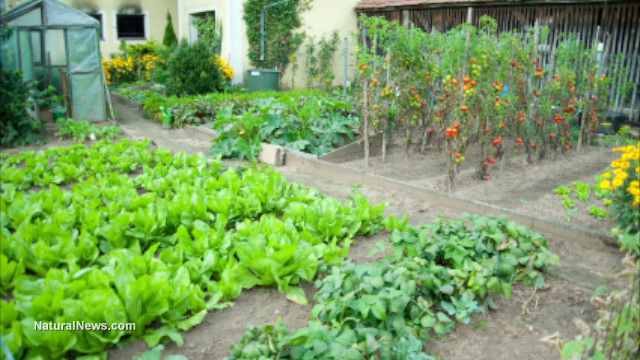Missouri family forced to destroy their home garden thanks to new city ordinance... no citizen shall be allowed to grow their own food!
Friday, April 08, 2016 by: J. D. Heyes
Tags: city ordinance, family garden, food security

(NaturalNews) More and more, our elected leaders have taken it upon themselves to abuse our trust, abuse our rights and do whatever they can to ensure that we remain wedded to "the system" – one that they control, of course. Long gone are the days when our founding fathers valued the attributes of individuality and self-sufficiency, as another example of this – from Missouri – demonstrates.
In Sugar Creek (Pop. 3,345 according to the 2010 Census), it is now illegal to grow food on your own property, and if you try, not only will you be required to destroy your garden, but you will be subjected to fines and, no doubt eventually, jail.
As reported by KSHB in Kansas City, Sugar Creek city councilmen passed an ordinance a few days ago making it illegal to grow a vegetable garden in the front yard of homes. One resident, Nathan Athans, who prides himself in being able to provide food security for his family, believes the new ordinance is aimed at him.
As the local news team reported, Athans grows a number of different vegetables on his front lawn and spends a great deal of time caring for his garden and working to improve its bounty.
"I'd probably say about 300 hours [so far this year], I spend all my free time out here," he told the local news crew.
"We paid our citation"
Again, a big part of the reason he spends so much time there is because he's trying to care for his family. "I want [them] to know where their food is coming from," he told the news crew. "I don't want to have to go to the grocery store and worry about what was done to that food."But nosy neighbors and authoritarian city officials don't share his view or enthusiasm. Last summer, the city cited Athans for weeds in his garden, but he said he complied with the order to remove them.
"We did it, completely weed-free, we paid our citation," he said.
A city official, Paul Loving, disagreed, however.
"I don't know that there would have been a problem with them had the gardens been well kept, they weren't," he said, referencing the new ordinance which says that food vegetation cannot be within 30 feet of a city street.
Athans said he can't grow his garden in the backyard because it is heavily shaded and only gets about two hours' worth of sunlight a day, even during the long, dog days of summer, in certain areas.
Loving claims that the city was receiving too many complaints about the Athans garden, so officials decided the ordinance was the only way to deal with them (rather than, say, telling butt-inski neighbors that the property belongs to the Athans, their taxes and fees for the property are not delinquent and they're not hurting anyone by growing food).
Who's being 'unreasonable'?
"Because I want my yard a certain way doesn't mean the neighborhood has to keep his yard the same way, but I do have an expectation that we'll all be reasonable in what we put in our front yards," Loving said.Guess the city doesn't have to be "reasonable," though.
Meanwhile, others are finding ways to turn their small tracts of land into food production zones, as reported by Homesteading.news. The site notes that every bit of space can be used in some way to grow food, due to advancing technologies like the Mini-Farm Grow Box from Food Rising, developed by Natural News editor Mike Adams, the Health Ranger, and also breakthroughs in planting techniques.
Also, the site notes that increasingly, in small communities, suburbs and even larger cities, so-called "community food plots" are on the rise as citizens transform unused lots and other plots of land into useful agricultural space.
Sources:
KSHB.com
HomeSteading.news
FoodRising.org
City ordinance at FETCH.news
Get independent news alerts on natural cures, food lab tests, cannabis medicine, science, robotics, drones, privacy and more.
Take Action: Support Natural News by linking to this article from your website
Permalink to this article:
Embed article link: (copy HTML code below):
Reprinting this article:
Non-commercial use OK, cite NaturalNews.com with clickable link.
Follow Natural News on Facebook, Twitter, Google Plus, and Pinterest
- Newly released JFK files reveal Pentagon's role in creating Lyme disease and covid in the same lab
- DEADLY DECEPTION: How COVID vaccines increased mortality rates and why authorities hid the truth
- CDC finally halts $11 billion COVID funding scam as health officials admit the ‘pandemic’ was a fraud
- Here are TEN all-natural ways to protect your garden without using harmful chemicals
- GAIN-OF-FUNCTION CAT-BIRD-FLU now on the rise as nearly a dozen cats in Colorado "test positive" for Bird Flu due to contaminated cat food
- Ginseng's hidden anti-aging power: How compound K is rewriting the rules of skincare
- “Endgame: The Hidden Agenda 21” unveils a world of conspiracy and control
- ATTENTION PRESIDENT TRUMP: Please WITHDRAW your nomination of Dr. Susan Monarez for CDC Director as she is a VAX FANATIC and TOXIC JAB ZEALOT
- Senate Democrats deny censorship industrial complex existed, defend government's role in silencing dissent
- Scientists demand FDA withdraw mRNA COVID vaccines amid contamination and gene therapy concerns
- “The shame of Minnesota”: Somali immigrants behind $250 million child nutrition fraud in largest COVID-era scam
- L.A.'s rebuilding nightmare: Only 4 permits issued after fire destroys 6,000 homes
- Former Congresswoman exposes CCP's deep infiltration of California through universities, ports, and fentanyl
- Despite surge in MMR vaccination in Texas, measles outbreaks continue: Is VACCINE SHEDDING fueling the spread?
- PROCESSED TABLE SALT in foods found to fuel depression
- Chewing gum's dirty secret: How your daily habit could be flooding your body with microplastics
- Judicial bias exposed: Judge who blocked Trump's gang deportations attended secretive left-wing conference
- BPA: The hidden hormone disruptor sabotaging your health - and how to fight back
- Newly released JFK files reveal Pentagon's role in creating Lyme disease and covid in the same lab
- Elon Musk: Aliens could be here on Earth RIGHT NOW
- Festive flavors: The sweet history, nutritional profile and health benefits of pecan pie
- Trump reverses course on Gaza plan, says “nobody is expelling Palestinians”
- Reclaim your health: How midlife exercise reverses years of inactivity
- Big Pharma's $8 Billion bribery scheme exposed: how doctors are pushed to prescribe junk science, not heal
- Boys are back in town: Trump’s patriotic alpha crew takes the wheel while toxic females ride in the backseat
- EPA advisor admits the agency is funneling billions to climate groups ahead of Trump’s return to White House
- Space war brewing? Russia threatens to destroy Starlink satellites
- Survival 101: Effective EMF blocking techniques
- A lack of integrity in Academia: Harvard professor found GUILTY of fraudulent research to promote CRT theory
- Mike Adams Sermon 66: God will DESTROY ISRAEL for its wickedness
- 5 Simple steps to boost your brainpower: How to strengthen executive function in a distracted world
- Rep. Nancy Mace introduces bill to ban biological males from female facilities on federal property
- Sugarcane extract superior to cholesterol-lowering drugs?
- WHO focusing more on policing speech about public health and implementing global surveillance systems
- Pilots report mysterious lights 'moving at extreme speeds' across Oregon skies
- Dr. Mike Yeadon releases 15-minute testimony - WATCH - about genocidal intent of COVID “vaccines”
- EPA advisor admits the agency is funneling billions to climate groups ahead of Trump’s return to White House
- The Health Ranger releases “Vaccine Zombie” song and music video, using AI-animated zombies for the music video
- California's social media censorship law struck down: A victory for free speech or a threat to online safety?
- Dr. Mike Yeadon releases 15-minute testimony - WATCH - about genocidal intent of COVID “vaccines”
- The pandemic as a tool for INDOCTRINATION: Understanding “The Indoctrinated Brain” by Dr. Michael Nehls
- Florida takes a stand: DeSantis proposes permanent ban on mRNA vaccine mandates
- Mike Adams releases country western hit single: Goin’ Back in Time is Comin’ Home
- Mike Adams releases music poetry sensation: A Child of God
- “Why we influenced the 2020 elections”: Facebook files reveal the coordinated effort to bury the Hunter Biden laptop story
- RFK Jr. clears key hurdle: Sen. Susan Collins backs controversial HHS nominee, signaling a new era for health policy
- Unpacking the Lies That We’ve Been Fed – new song and music video released by Mike Adams, the Health Ranger
- Mike Adams releases new song and music video: Nothing More Disgusting Than a Globalist
- Newly released JFK files reveal Pentagon's role in creating Lyme disease and covid in the same lab
- Congratulations to the FULLY UNVACCINATED as you resisted the COVID-19 PROPAGANDA MACHINE fueled by over $100 BILLION
- Michigan sheriff announces criminal investigation into 2020 election crimes, Dominion Voting Systems
- Israeli soldiers accused of even more torture and abuse in the West Bank
- Migrants are taking advantage of recent hurricanes to scam residents and loot their homes
- House Intelligence Committee calls for the ARREST and PROSECUTION of Dr. Anthony Fauci
- Red Cross issues warning to stop blood plasma donations from vaccinated people
- Scientists confirm: GENIUS brain function can be spontaneously unleashed in humans without any apparent cause
- EPA advisor admits the agency is funneling billions to climate groups ahead of Trump’s return to White House
- HYSSOP: What research reveals about the health benefits of this ancient holy herb
- Two containers with completed ballots fall out of truck in Florida
- Fully vaccinated about to see “tsunami” of illness and death, warns virologist
- Global leaders unite to clamp down on “misinformation” with UN-backed Cascais Declaration
- BREAKING: 2025 NDAA authorizes mandatory military draft of WOMEN across America… as Pentagon pursues global NUCLEAR war with both Russia and China at the same time
- Michael Yon warns of a ZIONIST TAKEOVER in Trump’s second administration
- BOMBSHELL: DNA testing kits are a SCAM to develop ethnic-specific bioweapons
- Ozempic and Wegovy weight loss drugs are injectable LIZARD VENOM PEPTIDES that may unleash a devastating wave of organ failure… side effects align with symptoms of SNAKE BITES
- Israeli soldiers accused of even more torture and abuse in the West Bank
- These 13 countries just signed an agreement to engineer a global FAMINE by destroying food supply
- NASA admits that climate change occurs because of changes in Earth’s solar orbit, and NOT because of SUVs and fossil fuels
- RFK Jr. clears key hurdle: Sen. Susan Collins backs controversial HHS nominee, signaling a new era for health policy
- Sermon 30: How Jesus reveals Caesar’s FAKE CURRENCY and FALSE AUTHORITY
- Coriander seeds: Ancient medicine backed by modern science
- Arizona officials claim Maricopa County needs 10-13 days to tabulate results of the election
Science News & Studies
Medicine News and Information
Food News & Studies
Health News & Studies
Herbs News & Information
Pollution News & Studies
Cancer News & Studies
Climate News & Studies
Survival News & Information
Gear News & Information
News covering technology, stocks, hackers, and more



"Big Tech and mainstream media are constantly trying to silence the independent voices that dare to bring you the truth about toxic food ingredients, dangerous medications and the failed, fraudulent science of the profit-driven medical establishment.
Email is one of the best ways to make sure you stay informed, without the censorship of the tech giants (Google, Apple, Facebook, Twitter, YouTube, etc.). Stay informed and you'll even likely learn information that may help save your own life."
–The Health Ranger, Mike Adams












































